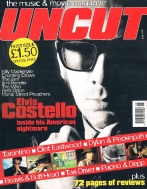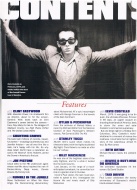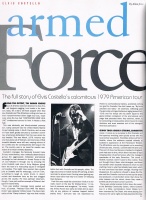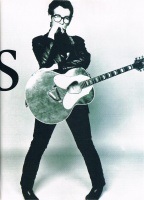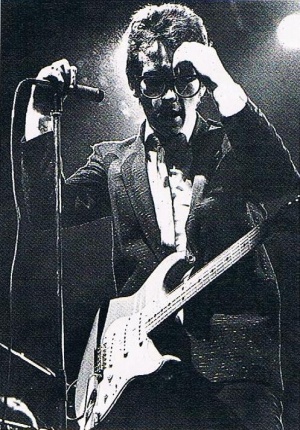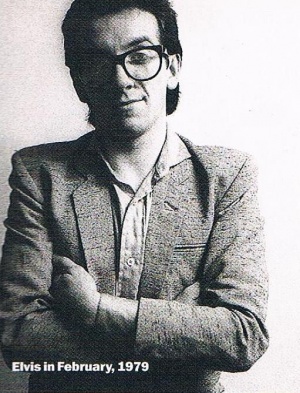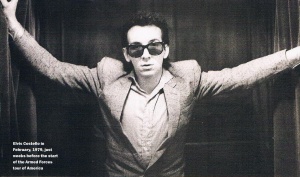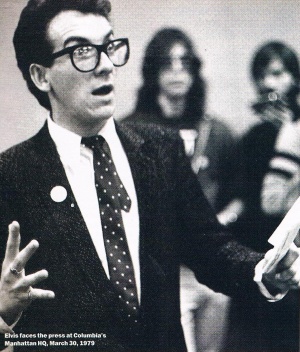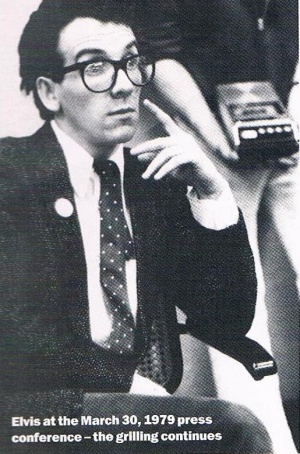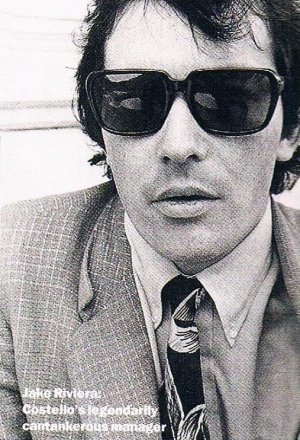Uncut, June 1997: Difference between revisions
(+image links) |
(+more text +more images) |
||
| Line 25: | Line 25: | ||
Area with posters that proclaimed them as "THE ONLY ENGLISH BAND THAT REALLY MATTERS". This would have been enough to infuriate Costello at the best of times, but does little to fully explain the tempestuous ferocity of his performance. He treated the Berkeley audience to a scourging 40-minute set and split, rejecting the clamourous demands for an encore. The audience was livid. They howled for more, and when they didn't get it they started ripping out seats and stoned The Attractions' tour bus. smashing windows. With the crowd turning ''really'' ugly. Costello and his then-girlfriend. Bebe Buell, were whisked through the backstage area and made a hasty, heads-down exit. | |||
[[Special:WhatLinksHere/Greil Marcus|Greil Marcus]], the distinguished American critic, was at the concert and managed to persuade Jake Riviera to escort him backstage for a word with Costello. Costello promptly ignored him, turned his back and stalked off. At which point, Marcus later claimed, Jake turned on him and hissed: "If you quote me. I'll kick your ass." Marcus duly reported the encounter in ''New West'' magazine. "The only reason I wrote it was that Jake threatened to do me bodily injury if I did." Marcus subsequently informed ''Rolling Stone''. | |||
"Jake's just a little thug," Marcus went on. "His commercial strategy has always been We don't need you,' and it's a perfectly decent strategy. The concert was meant as an insult and performed as such. and people caught on." | |||
The tour turned south, into Texas, still beleaguered, hounded by trouble and bad luck, Costello was hit by a stomach virus in Dallas. A week of shows was cancelled. There was, simultaneously, a growing disenchantment within the Costello camp with the way Columbia were promoting both the tour and the record, the feeling that the label wasn't flexing enough muscle to keep the momentum going flat-out. When a New York radio station received more than a quarter of a million calls for 1,200 free tickets they were raffling for a Costello concert in the city, Riviera had approached the record company for the financial backing to book Elvis into Shea Stadium. Columbia turned him down. Jake was typically furious. The next day, he sent a van-load of shovels to the Columbia office, addressed to its chief executives. There was a note, too. "If you really want to bury my act," it said, "I though you could do with some help..." | |||
There were more problems in [[Concert 1979-03-06 St. Louis|St Louis]], Missouri. Columbia had agreed with the city's premier FM radio station, KSHE, that they could sponsor Costello's concert at the Kiel Opera House. As part of the arrangement, KSHE would broadcast the show. Before he went on stage, Costello had learned that KSHE had only given his albums moderate exposure, while their main local rivals, KADI. had been pumping out his music on their wavelength. KSHE were therefore horrified when Costello dedicated his first encore, "Accidents Will Happen". to "all the boys at radio station KADI". The KSHE people were even more stunned when Costello went on to introduce "Radio Radio" with another unflattering broadside against their organisation. "Now I want to dedicate this song," he began, "to all the local bastard radio stations that don't play our songs ... and to KSHE!" | |||
The KSHE bureaucracy were furious. Costello's records were dropped completely from their playlists. Columbia were also irate. The label was worried about dropped sales for ''Armed Forces'' as a result of the KSHE ban. Apologies were demanded, and it was left to Alan Frey, the head of Costello's US management company, to placate the offended programme controllers at KSHE. After four days of smooth-talking persuasion, KSHE backed down and Costello's records went back on the air. | |||
By then, of course, Elvis was long gone from Missouri. He was heading north, now; through the gulping darkness of the great American night, which, in a town called Columbus, in the state of Ohio, would threaten to rise up and swallow him, bones, buttons, hair, temper and all. | |||
This is what you would have noticed most, if you'd been there: the desperate clutch of the dead, dry air. It is always the same in these places. The whistling hum of the air-conditioning; the dim lights, the dumb waiters: the hard luck stories at the bar; the dentural click of ice against glass as the drinks keep coming, round after round. | |||
It was the night of March 16, 1979, and The Attractions were in [[Concert 1979-03-15 Columbus|Columbus]], an inconspicuous, medium-sized mid-western city on Highway 40, half-way between Cincinnati and Cleveland. The group had just played a dull, routine show in town and Costello and Attractions' bassist Bruce Thomas were back at the Holiday Inn, drinking. Costello wasn't drunk yet, but he was getting there. | |||
That night, Stephen Stills had also played a gig in Columbus. He was in the Holiday Inn bar now, too, with his manager, Jim Lindersmith, and various members of his band and road crew, including backing singer Bonnie Bramlett and Joe Lala, his percussionist. | |||
Stills had been a founder member of Buffalo Springfield, legends of West Coast rock in the mid-Sixties. He had gone on to form Crosby, Stills And Nash, whose winsome harmonies and melodic acoustic strumming had made them darlings of the Woodstock generation. With the subsequent addition of Stills' old Buffalo Springfield sparring partner, the maverick guitar brigand Neil Young, CSN&Y, as they became, went on to even greater fortune as one of the most popular American supergroups of the early Seventies. | |||
Since the demise of that band, however, Stills career had only spluttered along. beset by drug abuse and a general cantankerousness that made him increasingly difficult to work with. He was now muddling through a forlorn middle-ground, his music of no reasonable interest to anyone apart from die-hard nostalgists for a wiped-out era. Bramlett, meanwhile, was a hard-bitten former Ikette who had enjoyed some success as one half of Delaney & Bonnie, a husband-and-wife white soul act that had been briefly fashionable at the drag end of the Sixties. Following her divorce from Delaney and the collapse of their group, she had struggled through an undistinguished solo career and ended up a bedraggled alcoholic. Rehabilitated now, she had joined Stills for an appearance at the Havana Jam, two months earlier. | |||
Together, Stills and Bramlett will have represented everything that Costello despised about American rock — its self-indulgence, its corpulence and slothfulness, its abject worthlessness. When he accepted an invitation to join the Stills entourage for a drink, Costello must have known that he was tempting the devil. | |||
The trouble started when a local fan started pestering Costello about his attitude towards America and Americans. | |||
"We hate you." Costello snarled. "We just come here for the money. We're the original white boys and you're the colonials." | |||
This was an example of a heavy-handed line in provocation that had been patented by Jake and which had since become familiar to anyone who'd come across the Riviera-Costello circle during one of their more intolerant ranting moods. Most people, finding either Jake or Elvis on course for this kind of volcanic verbal onslaught, very sensibly kept their heads down until the storm blew itself out and conditions returned to normal. What you didn't do was show any visible sign of being upset. This only encouraged them. | |||
Stills and his party unfortunately fell for the whole routine and became immediately defensive. At which point, Costello upped the tempo and apparently dismissed the entire American nation as "just a bunch of flea-bitten greasers and niggers." This was bound to cause the uproar Costello was looking for, and of course it did. One account of the incident has a member of Stills' crew grabbing Costello by | |||
| Line 49: | Line 84: | ||
{{Bibliography images}} | {{Bibliography images}} | ||
[[image:1997-06-00 Uncut cover.jpg| | [[image:1997-06-00 Uncut cover.jpg|x190px|border]] | ||
<br><small>Cover.</small> | [[image:1997-06-00 Uncut page 03.jpg|x190px|border]] | ||
<br><small>Cover and contents page.</small> | |||
[[image:1997-06-00 Uncut page 56.jpg| | [[image:1997-06-00 Uncut page 56.jpg|x200px|border]] | ||
[[image:1997-06-00 Uncut page 57.jpg| | [[image:1997-06-00 Uncut page 57.jpg|x200px|border]] | ||
<br><small>Page scans.</small> | <br><small>Page scans.</small> | ||
<br> | |||
[[image:1997-06-00 Uncut photo 01 gs.jpg| | [[image:1997-06-00 Uncut photo 01 gs.jpg|300px|border]] | ||
<br><small>Photo by [[Gus Stewart]].</small> | <br><small>Photo by [[Gus Stewart]].</small> | ||
[[image:1997-06-00 Uncut photo 02 ps.jpg| | |||
[[image:1997-06-00 Uncut photo 02 ps.jpg|300px|border]] | |||
<br><small>Photo by [[Pennie Smith]].</small> | |||
[[image:1997-06-00 Uncut photo 00 ps.jpg|300px|border]] | |||
<br><small>Photo by [[Pennie Smith]].</small> | <br><small>Photo by [[Pennie Smith]].</small> | ||
<br><br><br> | |||
[[image:1997-06-00 Uncut photo 04 cp.jpg|300px|border]] | |||
<br><small>Photo by [[Chuck Pulin]].</small><br> | |||
[[image:1997-06-00 Uncut photo | [[image:1997-06-00 Uncut photo 05 cp.jpg|300px|border]] | ||
<br><small> | <br><small>Photo by [[Chuck Pulin]].</small><br> | ||
<br><br><br> | |||
[[image:1997-06-00 Uncut photo 03 bp.jpg| | [[image:1997-06-00 Uncut photo 03 bp.jpg|300px|border]] | ||
<br><small>[[Jake Riviera]] photo by [[Barry Plummer]].</small> | <br><small>[[Jake Riviera]] photo by [[Barry Plummer]].</small> | ||
Revision as of 22:34, 23 July 2013
|
